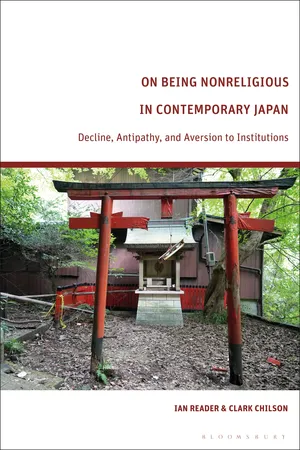
On Being Nonreligious in Contemporary Japan
Decline, Antipathy, and Aversion to Institutions
- 281 pages
- English
- PDF
- Available on iOS & Android
On Being Nonreligious in Contemporary Japan
Decline, Antipathy, and Aversion to Institutions
About this book
Challenging the notion of the nonreligious in Japan being religious through tradition and institution, this book demonstrates how negativity and antipathy for religion relate to religious decline in Japan today. Why do most Japanese say they are 'nonreligious' (mushukyo)? Since the 1990s, scholars have answered this key question for understanding religion in contemporary Japan as follows: although the Japanese say they are nonreligious because they do not identify with a particular religious tradition or institution, they are in fact religious through their traditional practices; New Year's visits to shinto Shrines, Buddhist mortuary rites and festivals (matsuri) are typically seen as customs rather than as religious. Challenging this answer, this book argues that many Japanese say they are nonreligious because they actually dislike religion and want to distance themselves from it. To support this argument, the book explores how religion is in decline in Japan today. Demonstrating how negative images of religion are produced in the mainstream media, in popular culture, and by various groups and people, this book also explores specific case studies such as anti-cult organizations, lawyers, government agencies, intellectuals, and religious organizations. Ian Reader and Clark Chilson argue that popular negative images and perceptions about religion create an 'ecology of dislike', which encourages disassociation from religion and exacerbates problems for religions today. Overall, this book provides a new perspective on religion in contemporary Japan that has implications for our understanding of secularization in the modern world.
Frequently asked questions
- Essential is ideal for learners and professionals who enjoy exploring a wide range of subjects. Access the Essential Library with 800,000+ trusted titles and best-sellers across business, personal growth, and the humanities. Includes unlimited reading time and Standard Read Aloud voice.
- Complete: Perfect for advanced learners and researchers needing full, unrestricted access. Unlock 1.4M+ books across hundreds of subjects, including academic and specialized titles. The Complete Plan also includes advanced features like Premium Read Aloud and Research Assistant.
Please note we cannot support devices running on iOS 13 and Android 7 or earlier. Learn more about using the app.
Information
Table of contents
- Half Title
- Title Page
- Copyright Page
- Dedication
- Contents
- Figures
- Acknowledgements
- Note on conventions
- Introduction: Religion’s bad reputation
- Chapter 1: Religion in trouble: Decline and dissociation
- Chapter 2: Shaping negativity: Media and amplifiers of antipathy
- Chapter 3: Other shapers of negativity: Pressure groups and political agencies
- Chapter 4: Religion as deviant, dangerous and disturbing
- Chapter 5: Money, privileges and exploitation
- Conclusion
- Notes
- References cited
- Index